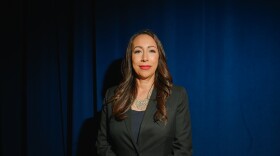Smoking is the number one cause of preventable death in the U.S. It’s also one of the leading causes of cancer.
Proposition 29 on the June 5 ballot aims to make smokers pay their share of the burden. The measure would raise tobacco taxes in California by a dollar a pack. It would generate an estimated $600 million a year for cancer research.
A number of San Diego institutions could benefit.
At La Jolla’s Sanford-Burnham Medical Research Institute, more than 500 people are involved in cancer research.
Dr. Sara Courtneidge directs one of the labs. For more than seven years, Courtneidge has been studying how cancer cells invade tissues.
"Both in the primary tumor that people get, but also in the spread of the cancer around the body, which is the thing that most people will die of, the metastases that they have," Courtneidge said. "And so we’re very interested in defining the mechanisms by which cancer cells move, and invade. And then also thinking about ways that we could come up with new therapeutics that would target that specific mechanism.”
Courtneidge said it takes years of false starts and multiple clinical trials to get even one potential cancer drug to market.
And that requires a lot of money.
Courtneidge and other cancer researchers’ main source of funds is the federal government.
But she pointed out federal grants are becoming much tougher to get than they used to be.
"We have a lot of ideas, and particularly in California, there are some terrific cancer researchers who are being limited right now in terms of what they can do," Courtneidge said. "It’s not their imagination that’s limited, but it’s the resources for them to be able to bring this forward."
In addition to the $600 million for cancer research, every year Prop 29 would also generate an estimated $179 million for anti-smoking campaigns.
The American Lung Association is one of Proposition 29’s major backers.
The Association’s Debra Kelley said California used to have one of the highest tobacco tax rates in the country. But since California last raised tobacco taxes in 1998, a lot of other states have passed it by.
"Well, we are standing at a pathetic 33rd," Kelley said. "That means 33 other states have higher tobacco taxes than we do."
Kelley explained under Proposition 29, the tax on a pack of cigarettes would jump from 87 cents to $1.87.
"The only people in California who are going to pay this tax are the 12 percent who continue to smoke, continue to buy tobacco products," said Kelley. "And so what’s going to happen is, they’re going to be more motivated to quit smoking, or they’re going to smoke less, fewer kids are going to start smoking. And so all together, this is going to mean a huge decrease in the number of people who smoke."
And that possibility has tobacco companies up in arms. They’ve bankrolled a massive ad campaign against Proposition 29.
"I’m against smoking. So I thought Prop 29 was a good idea," begins one of the TV ads. "Then I read it. It raises $735 million in tobacco taxes. But not one penny goes to new funding for cancer treatment."
"It imposes nearly a billion dollars in new taxes on Californians, but doesn’t require it to be spent in California creating jobs. That's not right," another TV ad states.
As of mid-May, tobacco giants have committed nearly $40 million to defeat Proposition 29. That’s nearly five times as much money as backers have raised.
But supporters of the measure remain undeterred.
San Diego allergist Michael Welch admits that California smokers already pay more than $5 a pack.
"It’s an expensive little pastime to smoke. But apparently it isn’t a deterrent enough," Welch said. "And there’s data to show that for about a 10 percent increase in the cost of a pack of cigarettes, about 4 to 5 percent of people will either not take up the habit, or stop the habit if they have the habit. And those numbers sound good."
And the possibility of getting more money for cancer research sounds good to San Diego’s scientific community, especially Dr. Kristiina Vuori. She’s the president of the Sanford-Burnham Medical Research Institute.
"Biotechnology, medical research, is one of the drivers for the economy in San Diego, and in many parts of this state in general," Vuori said. "And I think it would be very helpful to spark the economy at these times when things are not a rosy as they were some time ago."
A poll by the Public Policy Institute of California in March showed 67 percent of likely voters supported Prop 29.









